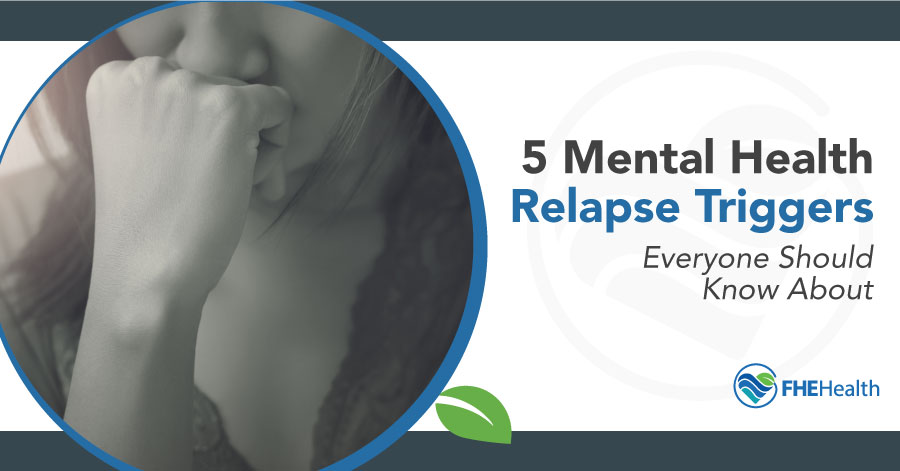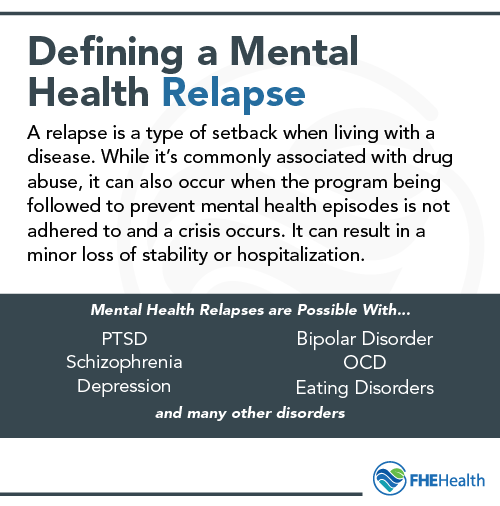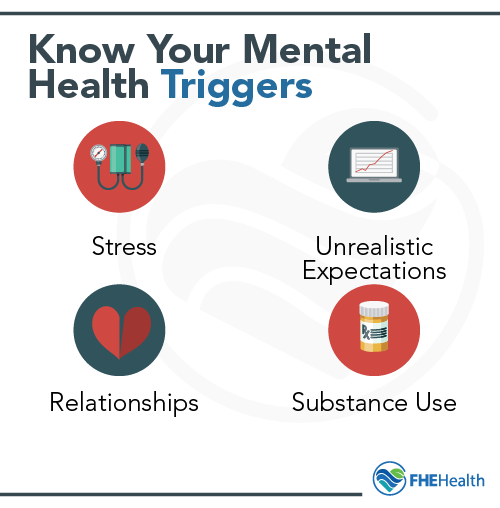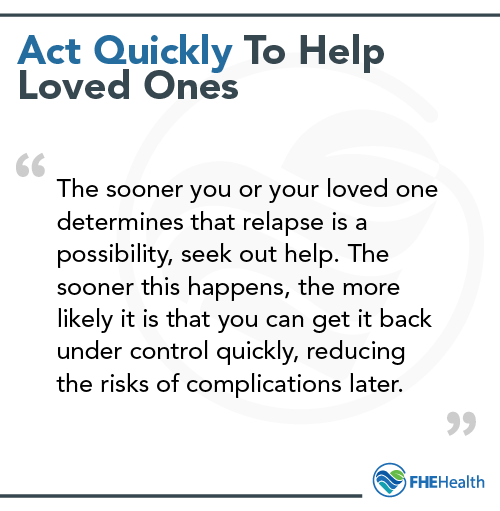
Updated May 16, 2023
Early Signs of Relapse
As with many diseases, it is possible to suffer a mental health relapse, even when medications are used routinely and counseling is provided. If you have a mental health disorder, it’s essential to know what the early warning signs of a mental health relapse are so you can react to them.
If you are struggling now with symptoms of relapse, please call FHE Health for immediate help. Don’t wait until it worsens to get the help you need.
What Is a Mental Health Relapse?
 A relapse is a type of setback. It can occur in most types of mental illness. When it happens, it can cause a person to experience severe consequences and may lead to hospitalization. Though this can be a challenge, those suffering a relapse may still be able to get significant help to restore balance and stability to their lives.
A relapse is a type of setback. It can occur in most types of mental illness. When it happens, it can cause a person to experience severe consequences and may lead to hospitalization. Though this can be a challenge, those suffering a relapse may still be able to get significant help to restore balance and stability to their lives.
Is a Mental Health Relapse the Same as an Addiction Relapse?
In a way, mental health relapses can be similar to what happens when a person relapses and begins using drugs and alcohol again. However, there tends to be a significant difference here simply because a person with a mental illness doesn’t choose to make this decision. It can happen for many reasons, including the triggers listed below. It can also happen for an unknown reason, which can make it less predictable than when relapse occurs with addiction issues.
Examples of Mental Relapse & How People Experience Them
Each disease or condition may have its own set of relapse signatures. Here are a few examples.
PTSD
A person suffering from post-traumatic stress disorder may begin to feel anxiety and a loss of control in certain situations. Even if they seemed to have been fully in control previously, they may experience instances of heightened awareness of their surroundings linked to the traumatic event.
Schizophrenic Episodes
A person with schizophrenia may develop complete control over their condition with medication and therapy, but they may still develop a sudden change in personality. This is referred to as a schizophrenic episode. It can cause a break during the treatment process and cause a sudden loss of reality. It can also lead to a more significant break during psychotic episodes.
Depression
Depression is one of the most challenging of all conditions to monitor relapse for because people feel sad from time to time as a regular part of life. However, a person with depression who seems suddenly sad without an obvious cause may be suffering from a relapse. This can be sudden and significant, increasing the risk of suicidal thoughts.
Manic or Bipolar Episodes
In this situation, a person may begin to display the typical very high and very low range of emotions that occur in bipolar. When a relapse happens, a person can become unstable quickly, requiring help.
Be Prepared: Know Your Triggers
What we do know is that many people who suffer mental illness relapse because of exposure to triggers. These are specific experiences, locations, people, or events that seem to bring back memories or create instances of heightened mental illness. This is one of the most common causes of a mental health relapse.
When exposed to the person causing harm to them, a person with PTSD may react, for example. If a person with depression suffers a significant instance of life-changing circumstances, such as the death of a close loved one, that can trigger their depression to worsen, breaking through medication treatment.
What Are the Common Mental Health Relapse Triggers?

It’s possible to know your triggers. In other words, just like with addiction relapse, by avoiding any type of trigger that could cause a relapse, it may be possible to maintain mental stability. Some common types of triggers include the following:
Stress
Most everyone deals with daily stress, but those with a mental illness may struggle with managing it well. This can trigger a mental illness relapse, especially if that stress is sudden, significant, or long-lasting. Stress taxes the brain and the body due to the constant presence of fight-or-flight hormones. This makes it hard for a person with mental illness to maintain control. It can also impact the function of medications.
Relationship Issues
Breaking up with a loved one, divorce or death are common relationship triggers. These may not be situations you can avoid, though. Rather, if you are going through these more challenging instances, it is best to work closely with your therapist and doctors to monitor your condition to help you avoid the onset of significant relapse. A person with mental illness of any type may find it hard to navigate complex relationships with ease. This may mean there’s a need for more family members or support group therapy.
Unrealistic Expectations
Bipolar condition is a good example of how unrealistic expectations can create problems for a person with mental illness. If you’re hoping for a very good outcome to happen, and it doesn’t happen, it can create a very sudden drop in your mood. In some situations, these unexpected expectations can be related to school, relationships, work, or just day-to-day life. It can lead to difficulty coping with reality, especially when those expectations are life-changing.
Substance Use
Those who use drugs or alcohol while using medications for mental illness will find it challenging to control relapses. These substances change brain chemistry enough to make it very difficult to control outcomes. Many times, people using substances like this may be doing so because their current treatment plans are leaving them vulnerable to additional mental anguish or difficulty. Recognize the use of a substance like this as a good reason to get more advanced help.
Not Taking Medications
There is no bigger reason for a mental health relapse than this. It’s the most common cause of them. Yet, it is also the most preventable. Consistency with medications is essential. Over time, your doctor may need to adjust them to meet your needs better.
The Importance of Self-Care in Preventing Relapse
Self-care care is an important facet of personal health with both day-to-day and long-term benefits for any individual, but it’s especially important for those who may struggle with mental health triggers, recovery, and relapse.
By making self-care an intentional and proactive part of your life, you can gain better self-awareness and better perceive the subtle signs of relapse. In addition to reducing symptoms of anxiety and depression, prioritizing self-care can help improve stress levels, happiness, self-esteem, and productivity. By improving your well-being and reducing stress, you may be less likely to turn toward coping mechanisms that lead to mental health relapse.
Tips for Self-Care Practices
Although self-care is a crucial component of every mental health recovery journey, it’s important to understand that each individual has different self-care needs. Self-care can take many forms, such as:
- Practicing healthy sleep habits
- Eating nutritious foods
- Drinking enough water
- Practicing meditation and mindfulness
- Exercising regularly
- Setting personal boundaries
As you adopt new self-care practices, pay attention to how they make you feel and if they benefit your physical and mental health.
Make it a priority
Although self-care can seem like a chore and is easy to neglect during periods of high stress or busyness, those periods are often when it’s most important. Juggling obligations can make it challenging to accommodate basic self-care such as good sleep, meditation, or quality meals. Still, taking even a few minutes to prioritize yourself can not only reduce anxiety, depression, and other symptoms but can help reinforce and internalize that your needs are worth prioritizing.
Balance your self-care
Self-care isn’t just about practicing yoga and meditation. Self-care has many facets that represent different aspects of your life. To improve short and long-term wellness, a self-care practice should address the following facets:
- Emotional
- Spiritual
- Intellectual
- Physical
- Environmental
- Financial
- Occupational
- Social
Keep it simple and sustainable
Just as it’s easy to neglect self-care, it’s easy to overcomplicate it. By obligating yourself to too many wellness practices, self-care can become an overwhelming and exhausting task. In turn, an overly complex and unsustainable approach can lead to anxiety and negative feelings about tasks that are supposed to be good for you.
Instead, keep your self-care practices simple to find what works for you. Start by addressing basic needs such as sleep, nutrition, and other vital aspects of your health. Once you’ve established a healthy baseline of self-care, you can work toward adding other beneficial and sustainable self-care practices.
Set goals
Goal-setting is an important part of sustainable and effective self-care. By identifying tangible goals you can work toward, you can create intentions and mindfulness around your self-care practices that help you stay focused. For example, although 10 minutes of meditation can be challenging at first, setting an intentional goal can remind you why it’s important to stick with it. Make sure to start with small goals to manage your expectations and priorities.
Find support
Surrounding yourself with supportive individuals can help you focus on your self-care practices as well as find new ones. Whether you’re working with a counselor, exercising with a friend, or attending a group art class, being around similar mindsets can help you feel supported and focused.
 Identifying the Mental Relapse Early Makes a Difference
Identifying the Mental Relapse Early Makes a Difference
The sooner you or your loved one determines that relapse is a possibility, seek out help. The sooner this happens, the more likely it is that you can get it back under control quickly, reducing the risks of complications later. Men and women who experience any of these triggers or other changes in their lives should know that means they need a bit more help.
How to Seek Help for Mental Health Relapses?
Immediate Care and Support From FHE Health
With a team of compassionate counselors available 24 hours a day, we can help you with any mental illness relapse quickly. Contact FHE Health to learn more about the options available to you today.






